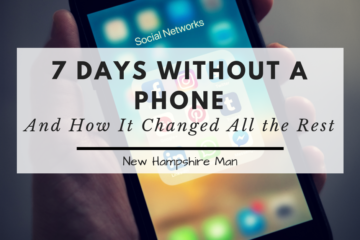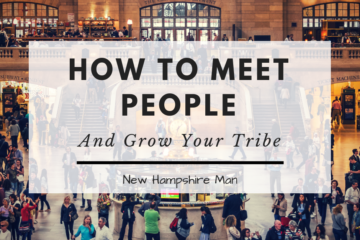One of 4 things are going to happen when your kids turn into adults.
They are either going to stay near you, or move away; and they will do so either by choice, or by force.
Which one of the four options do you think you’ll want, and what can you do to set the gears in motion for that desire to come to reality?
For clarity, let me explain the options as I see them.
Your kids leave by choice
The most vanilla version of this is that your kids reach the magical age of 18 and decide on their own that it’s time for them to seek opportunity elsewhere. For many families, that may include some college experience, and for others it might mean a faraway job opportunity.
The breadth of this is limited only by our imagination, but the point is that the person who is your child makes a conscious and deliberate decision to move away from home.
Your kids leave by force
This one gets more press these days because it’s an opportunity to lay blame on the rising generation for being lazy and worthless, which is absurd. But what this looks like is your kids reaching some age, be it the magical 18 or otherwise, where they are told that they are no longer welcome to seek refuge under your roof. Peace out whipper snapper. I’ve done my job, now go do yours.
The absurdity of the above claim is that parents have 18 (or so) years to help shape their children’s perspective on adulthood, so if they are lazy and worthless, the fault should not lie on them, but on their mentor. That’s my opinion in general, individual situations require individual analysis.
Your kids stay by choice
This is one we don’t hear much about, and even when we do we are probably quick to judge based on our social programming. “Johnny’s still living at home.” What’s funny, though, is that this can be the most lucrative and rewarding option for everyone. It essentially means that there exists enough opportunity and fulfillment for a young person to decide to stay even when given full autonomy to make the decision to go anywhere else in the world.
Your kids stay by force
This draws up the most somber emotions. There comes a time when the children are grown up, fully mature, but family obligations inhibit them from moving away, even though they want to. The things that come to mind that might drive this situation are family medical conditions where the young person stays as a caregiver, or a family business where the parents have placed a burden on their children to inherit the business, even if they don’t want to.
The Social Expectation
As alluded to earlier, the social expectation is that your children move away. It seems that we are supposed to really want them to move away, so much so that we’re supposed to look forward to it. And if they offer some resistance, we should resort to forcing them to move away. Suck it up butter cup.
I’ve thought a little about the history of that, or the evolution of that social normalcy and if you think waaaaay back, like 2 generations ago…wicked far back…that’s not how it used to be. I suspect we moved away from the model of kids staying near home mainly because of the perceived opportunities in growing city centers and secondly because of increased ease of mobility. My historical sense is that parents loved their kids so much they wanted to be able to offer them a life better than their own so they encouraged their children to go seek opportunity elsewhere. Noble. I dig it. But it stuck. And now it seems silly.
What actually makes sense
Speaking for myself, and many others, raising kids is a gigantic part of life, but it’s not the only part of life. Meaning, it’s ok to be a parent and still seek personal goals and aspirations. Doing both is ok. If you genuinely care about the people you’re raising (and I’ve never met a parent who confessed that they didn’t) it seems reasonable to raise them in such a way that you enjoy each other’s presence and enjoy sharing life with one another.
Tim Urban wrote a frequently cited post called The Tail End where he runs the math to determine that by the time your kids graduate high school, they will have likely spent 93% of the time they will spend with you in their life. He doesn’t state it directly, but maybe it’s not ridiculous to live near your kids and see them more than twice a year as they progress through adulthood.
When you take a few minutes to subjectively think about our social norm, doesn’t it seem ridiculous?
So here’s the thing, I have a 5 year old and a 5 month old. It’s a tad early for me to anticipate how I’m going to feel about the matter in 13 years, but I’m certain that I want to be a part of their lives for as long as I live.
Hmm, so maybe I don’t want my kids to leave
There are some really important points here to keep this train on the track. Let’s come out bright and early to announce that I’m not advocating your adult children leach off you for the rest of their life while not contributing to society or pursuing personal fulfillment. Actually, what I’m saying is that you can work together to achieve the EXACT OPPOSITE of that. Here are some things that would be required to make it work:
- Open and deliberate communication: just like with a marriage, any long standing relationship requires open, honest and frequent communication to set expectations and to make sure everyone gets heard.
- Space: In line with communication, everyone needs their space. The best model of this I’ve heard of is at Joel Salatin’s farm, Polyface Farm, where there are a few houses on big farm acreage. The growing family lives in the big house; the young couple, or the old geezers live in the small house. As the family changes, they move accordingly.
- Opportunity: This is the most important. In order for your children to want to stay near you, there needs to be opportunity for them to grow, contribute and live their own life of fulfilment.
- Total Autonomy: Everyone gets to make their own choice, no hard feelings should someone change their mind.
Do you see how that might work?
Hey kid, totally up to you, but if you want to stick around we have a place for you to stay and some opportunity for you to help grow our business, or you can tap our customer list and venture into generating a livelihood from your own passion. I’m happy to share the resources I have to help you get off the ground. But if you need to go see the world, that’s cool too. I’ll keep the offer on the table for as long as it makes sense for your mother and I.
Contradict me. Tell me I’m wrong. That makes SO MUCH sense to me I find it absolutely absurd that more (MOST) families don’t operate like this. What am I missing? I need to know because I’m going to spend the next 13 years trying to figure out how to make this an option, so save me that energy if I’m totally missing something.
Or. Buck the social norm and let’s figure it out together.
Reflections as a parent
As you know, I’m raising a family now. It’s awesome. I love being a dad.
We’re an hour to an hour and a half away from most of my family, and a 4 hour plane ride away from my wife’s family.
I genuinely envy the few people I see or hear about who share a property, or live very close by to the grandparents of their children. There’s the selfish desire for babysitting and a few cooked meals from time to time and someone else doing the dishes. And there’s the deeper desire for my children to have the opportunity to get to know and learn from their grandparents. So much wisdom in our parents that the young minds of our kids are prepared to sponge up. That’s a super-huge lost opportunity. Speaking for myself, I don’t feel that I ever really got to know my grandparents, and I’d like for my children to be able to say the opposite.
To be super clear, though, this is what I asked for. I left home very much by choice, not really knowing there were other options. I’ve seen the world and I’m quite grateful for that. My wife and I moved back to the same state as my parents for an education and job opportunity, and I’m thankful we’re as close as we are, but it’s still not the model I aspire for with my own kids.
It’s never too early to be thinking about this and I’m happy to have 13 years to talk it over and come up with ideas. As they say, we over estimate what we can do in one year, and under estimate what we can do in five, so 13 years is an eternity.
I’d really love your feedback on this. It’s a paradigm shift that I’m really passionate about and I hear almost nobody else talking about it. Leave some thoughts in the comments section below or find me on Facebook or just reach out through my contact page.
For more paradigm shifting freedom seeking please sign up for my newsletter.
-NHMan
[sibwp_form id=2]



